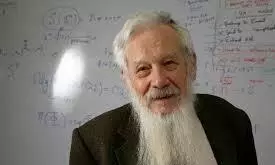
Indian universities urged to withdraw invitation to Zionist Nobel laureate
text_fieldsA group of 298 human rights activists, academics, and scientists has called on Shiv Nadar University and the Indian Statistical Institute (ISI) in Delhi to rescind their invitation to Zionist Nobel laureate Robert Aumann.
The renowned economist is scheduled to deliver a keynote address at a workshop hosted by the institutions on January 13-14, 2025.
Aumann, who was awarded the 2005 Nobel Memorial Prize in Economic Sciences for his work in game theory, has faced criticism for using his academic expertise to justify Israeli policies accused of violating Palestinian rights. The petitioners argue that Aumann’s Zionist stance and endorsement of policies supporting the ethnic cleansing of Palestinians are incompatible with the values of academic and human rights.
The signatories, which include peace activist Harsh Mander, economist Jean Dreze, linguist Ayesha Kidwai, and others, expressed dismay at the universities’ decision to invite Aumann amid growing international scrutiny of Israel’s treatment of Palestinians.
The petition highlights Aumann’s affiliation with "Professors for a Strong Israel," a group advocating for a “Greater Israel” encompassing territories from neighboring countries. He has previously described Israel’s 2005 withdrawal from Gaza as “ethnic cleansing” of Israelis and has supported policies seen as oppressive towards Palestinians.
“Aumann’s academic work cannot be divorced from his political beliefs, as he has repeatedly used his research to justify Israel’s authoritarian policies,” the letter states, adding that his Nobel Prize win was contested by many academics at the time.
The petitioners criticised the universities for undermining India’s long-standing support for Palestinian sovereignty. Drawing parallels to India’s own anti-colonial struggle, they argued that extending a platform to Aumann disrespects universal human rights and risks aligning Indian academia with oppressive ideologies.
The activists also highlighted the destruction of educational infrastructure in Gaza, describing it as “scholasticide.” They claimed that Palestinian academics and institutions have been systematically targeted since the Nakba of 1948, with 80% of Gaza’s schools reportedly destroyed.
The group warned that partnerships with Israeli academic institutions could entangle Indian universities in a “military-industrial complex” and contribute to normalising policies resembling those imposed on Palestinians.
“India is already emulating oppressive Israeli policies, including forced evictions, suppression of dissent, and minority marginalisation,” the letter stated. It urged the institutions to terminate collaborations with Israeli organisations and join the global Palestinian Campaign for the Academic and Cultural Boycott of Israel, likening it to the international boycott of apartheid South Africa.
The petitioners demanded a public announcement from the universities rescinding Aumann’s invitation, arguing that providing a platform to individuals endorsing human rights violations undermines the integrity of educational institutions.
As of now, neither Shiv Nadar University nor the Indian Statistical Institute has responded publicly to the demands.























